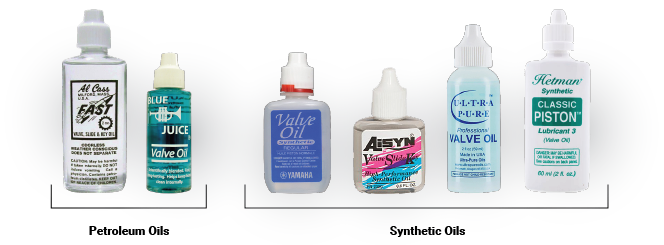Check out our first installment of My First Step, with Erin Garvey!
The New CajonTab!
We're excited to announce we're now stocking the CajonTab, by Louson Drums! The CajonTab takes playing the cajon into the realm of what the ukulele did for the guitar. The CajonTab isn't the same instrument as the cajon, but it's much more portable, and it has a great sound!
The CajonTab, just like a cajon, has a playing surface on the front and a resonating box behind it. Unlike most cajons, there is a port that allows the player to tune the pitch of the bass note, and it has a snare that you can "turn on or off".
Watch our video for the full demo! Stop by either of our two locations to check them out!
Valve Oil: Petroleum VS Synthetic
Petroleum VS Synthetic Valve Oil
By Tim Brennan
When it comes to valve oil for brass instruments, there is a wide variety to choose from on the market. Personal preference is what it boils down to in the end.
BUT. Let's explore the two main kinds of valve oil. Petroleum, and synthetic.
The basic difference between the two is that Petroleum oil is made up of molecules of varying sizes. When using a petroleum based oil, the smaller molecules tend to evaporate quicker, leaving only the larger molecules. Some say that the larger molecules which remain, give the valves a more sluggish feel. This also may lead to using the traditional petroleum oil more frequently.
Synthetic oil is made of molecules of similar size. A lot a lot of players say synthetic oil provides a more slippery feel when playing. They also find that they are lubricating less frequently with the synthetic oil.
So...."which one is better?" you may ask.
Truly, it is an individual preference. A lot of players of valved brass instruments will choose a petroleum oil, simply because that is what they have always used, it gives them the best results, and they are loyal to their brand which isn't necessarily a bad thing.
Al Cass is a popular brand, which I have personally used and seems a little lighter in viscosity. This makes it good for quick notes, but will have to be applied more frequently. Another petroleum based oil is Blue Juice. I have also used this brand, and have found it works well, but like the others, has to be applied more regularly and it has an "oily" smell. From my research, I have found that petroleum based oils also tend to leave a residue when they evaporate.
Many pro players use the synthetic oils for the simple reasons that they don't need to lubricate their valves as often, and they don't leave a residue after they evaporate.
There are several brands of Synthetic oils on the market today --- Ultra Pure, Alisyn, Hetman, and Yamaha are all popular with brass players. I have used Alisyn, and Ultra Pure, with excellent results. Hetman and Yamaha both have different grades of viscosity. Hetman choices are #1, #2, and #3. Yamaha has Light, Regular, and Vintage. From my understanding, the Vintage Yamaha oil is a good choice for the older instruments whose valves have NOT been rebuilt. A final bit of information on synthetic oils --- If you decide to switch to synthetic, it is recommended that you get the instrument ultrasonically cleaned prior to switching.
Whatever direction you decide to go, take care of your instrument and it will take care of you!
Music Madness: Trombone VS Tenor Sax
It's Music Madness time! We had quite the upset with our final match last week, Alto Sax took down Bass Clarinet, and our Bass Clarinet players felt that loss.
Today, Trombone is taking on the Tenor Sax!
Voting starts at 6PM!
Bravo, Warren Concert Band!
A standing ovation for the Warren Concert Band, Metropolitan Detroit Chorale, and the Horn Soloist, Cecilia Buettgen! What an inspiring performance yesterday, Bravo!




